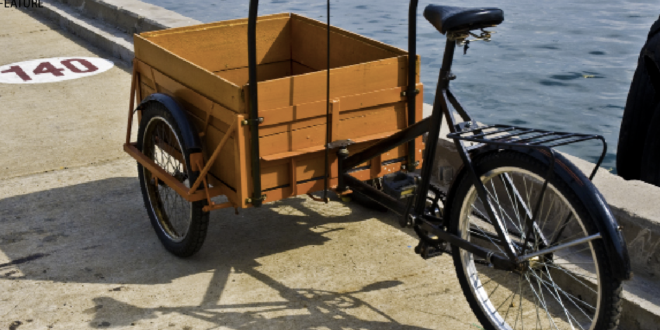In September, hot on the heels of the Department for Transport’s call for evidence on last-mile deliveries – to reduce delivery emissions, particularly from diesel vans – the Government pledged a £2 million subsidy to encourage the usage of e-cargo bikes. In a nutshell, businesses will soon be able to apply for up to £5,000 towards the purchase price of new e-cargo bikes, or up to £1,000 per bike. A Department for Transport spokesperson said they are still working through last mile consultation responses before deciding exactly how the scheme will work. However, we do know funding will be split between large and small companies.
Why e-cargo bikes?
The way we travel and deliver is creating serious challenges in the UK, from growing congestion and air pollution in our towns and cities to illnesses caused by physical inactivity. While cycles can replace car journeys, cargo bikes can help replace some van and lorry traffic. Vans are ten per cent of vehicles on the roads, and many of their loads could be moved to smaller, pedal-powered vehicles. E-cargo bikes, like e-bikes, have developed rapidly over recent years, and now come in a variety of shapes and sizes, and carrying capacities, with some able to transport loads of up to 250kg.
Neil Davis, a consultant working with Pashley Cycles, says: “E-cargo bikes are going to revolutionise things if we get it right. When you think about congestion, pollution, and in terms of wellbeing, the e-bike really opens up cycling.” The Bicycle Association says e-cargo bikes “can support the evolution of our cities into efficient, liveable, low carbon and high-tech hosts for smart business growth, while also providing flexible, accessible mobility for goods and people of all ages".
Cargo bikes are often faster and more efficient than motorised transport. They don’t get stuck in traffic, can be wheeled through pedestrian areas and parked easily on the street – and staff don’t need driving licenses to operate them. They can be used to deliver meat, flowers, bread, and can transport tradespeople and their tools between jobs. They can replace scooters for takeaway deliveries and can tackle household waste recycling services. They can even provide on-demand taxi services.
Several UK based companies are already proving cargo bikes work in a UK setting but
data on their success, or otherwise, can deter business investment. The Bicycle Association’s Peter Eland says: “Simple subsidies isn’t a silver bullet at all, but it sends the right message and it will be a welcome boost to anyone who’s setting up. The side effect of these grants is presumably monitoring the data that comes out of that. We need a big fleet experience as well as a small one.”
The Bicycle Association would like to see the Government fund a cargo bikes demonstration cities programme, potentially with micro-depots, to kick-start widespread cargo bike use and prove they work in a UK setting. It recommends £5-10 million for two or three cities over five years.
E-cargo bikes are already working – now they need scaling up. Zedify is a national ‘zero emissions’ cargo bike delivery service, launched in June 2018, and already operating out of depots in London, Cambridge, Brighton, Norwich, Waltham Forest and Glasgow. Sam Keam, co-founder of Zedify, welcomes the Government subsidy. He says: “One of the main barriers for companies to set up as a delivery scheme is the initial cost. An electric two-wheeler can cost £4,000, and a trike can be £7,000 to £9,000. The cost to get up and running, even for a small operator, is totally out of synch to what it would take to set up a van courier.”
Industry figures say because the current delivery model is loaded towards motorised transport, from gig economy operators who aren’t bearing full employment costs, to fuel duty freezes and free or cheap vehicle parking, more is needed for the cargo bike to become a viable delivery solution.
As Davis puts it: “While it is a good thing the Government is supporting e-cargo bikes, the amount is very low.” He would like to see further subsidies to UK manufacturers, like Pashley, as well as some sort of polluter pays scheme in cities to reflect the true cost of motor transport.
In the meantime, Zedify is taking cargo bike growth into its own hands. Zedify plans to rapidly scale up across the UK, and it is looking to set up a national franchise to deliver cargo bike services in the next couple of years.
Davis continues: “We would handle business customers nationally, and deliveries at city level, and we would provide a framework for training and software; crucially we would be developing our own software. We are in the testing phase at the moment, we want to be in most large UK cities in the next 1.5-2 years. We know the market is there and we know the demand is there, it’s just going to take demonstrating it is scalable.” It already works with companies like TNT and Yodel, and any franchise, operating to Zedify’s standards, could potentially take on those companies’ deliveries in those cities.
E-cargo bikes are for carrying people too. Pedal Me is a cargo and passenger carrying service that successfully crowdfunded more than £150,000 in just eight days in October, to buy more e-cargo bikes and train more staff, with a view to taking on companies like Uber in London. As Pedal Me discovered in March, cargo bikes can even continue operating in heavy snow, when other vehicles become stuck. Pedal Me co-founder Ben Knowles told BikeBiz that while Government support is welcome, and direct subsidies are helpful, the latter may not be the best way to encourage e-cargo bike growth.
“The issue, in general, is not the supply of cargo bikes (because they’re easy to offset against tax, as a capital item) but knowing how to use them. In our view subsidy would be better directed towards support of training, tech systems and maintenance – supporting the use of cargo bikes rather than the purchase,” he says. “We believe so strongly that these are the main barriers, we’ve even set ourselves up as a consultancy to support businesses wanting to overcome these barriers.”
Cycling and walking minister Jesse Norman says: “We are committed to creating a cleaner, greener future, and the new fund for e-cargo bikes will help to cut congestion and improve air quality, encouraging companies to replace older, polluting vans with a zero emission alternative. Businesses will soon be able to receive a contribution of up to £1,000 towards the purchase price of new e-cargo bikes, provided they follow a code of cycle safety good practice.”
Industry is generally supportive of standardised training for e-cargo bike riders to ensure operators’ credibility in the public eye. Both Pedal Me and Zedify have developed their own cargo bike specific training for riders. Keam says: “I think it is a great moment. If the funding is used well it could really accelerate things. Everyone is alarmed by poor air quality; the technology and the cargo bike is coming to maturity, I think it’s potentially very exciting.”
 BikeBiz Bicycle and cycling retail news
BikeBiz Bicycle and cycling retail news




